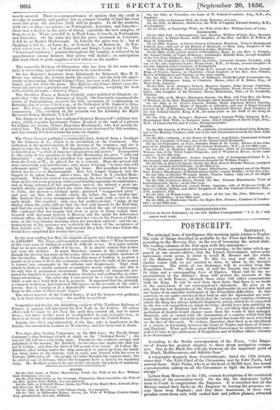POSTSCRIPT.
SATURDAY.
The principal item of intelligence this morning again relates to Naples.. The state of things described as probable by the Times last Saturday, is according to the Morning Post, on the eve of becoming the actual state. The leading columns of the Post open with this statement-
" Our Paris correspondent informed us yesterday, in the letter which ap- peared in our second edition, that the French Government, unless some unforeseen event occur, is about to recall M. Brenier and the whole of the Embassy from Naples. To this we may now add, that a similar course will, we are enabled to state, be taken by the Queen's Government. The whole of our diplomacy will be recalled from the Neapolitan Court. We shall send, as will the French, two line-of-bat- tle ships and a corresponding force of frigates. These will be the re- presentatives of the Alliance • these will protect the interests of the '
subjects of both Powers through these alone will either communicate with the King. It will be seen from these facts, that there is no doubt of the correctness of our correspondent's statement. He goes on to add, that the last despatches of the French diplomatist do not now hold out any hopes of an amicable settlement of the Neapolitan difficulties. In this assertion we are quite convinced that both he and the diplomatist are war- ranted by the truth. It is not likely that the unwise and cunning obstinacy which the King has always hitherto displayed, and in which he is supported by the few evil councillors on whom heleans should leave him suddenly on the arguments of England and France. It not likely that the doubtful mediation of Austria would change more than the words of that unhappy Monarch, who is cursed with the domination of a country which God has made the fairest and which his tenible misrule has made the most wretched on the face of the earth. We believe, therefore, that there is no likelihood of a return to friendship between the Court of Naples and those of France- and England. What part these great Allied Powers may be ultimately com- pelled to take in the settlement of Neapolitan and of Italian affairs, remains to be determined."


























 Previous page
Previous page